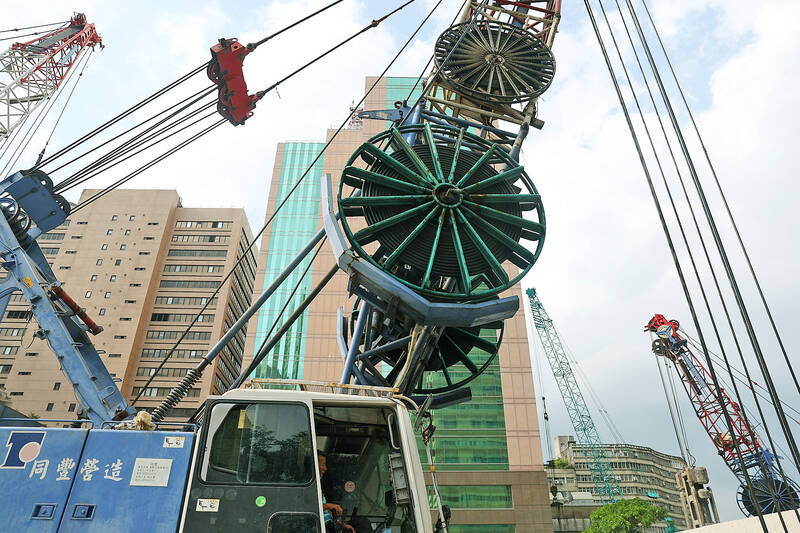Taiwan’s economy would probably grow more slowly this year than previously forecast, the government’s statistics office said yesterday, as weakening global demand weighs heavily on its key technology exports.
Taiwan, home to major tech companies including the world’s largest contract chip maker, Taiwan Semiconductor Manufacturing Co (TSMC, 台積電), has seen its exports contracting amid interest rate hikes around the world in response to rising inflation and growing US-China trade tensions.
Export orders slipped for an eighth straight month last month and missed forecasts.

Photo: CNA
The nation’s GDP is expected to expand 2.04 percent in 2023 from last year, the Directorate-General of Budget, Accounting and Statistics (DGBAS) said, revising down its earlier 2.12 percent growth forecast.
The economy is likely to grow at the slowest pace since 2015, the DGBAS said.
First-quarter GDP fell by a revised 2.87 percent year-on-year versus a preliminarily forecast 3.02 percent fall, the agency said, the worst performance since 2009.
“First-quarter inventory adjustment was very obvious,” DGBAS deputy head Tsai Hung-kun (蔡鴻坤) told reporters, adding that the adjustment was NT$50.5 billion (US$1.64 billion) in the fourth quarter last year, followed by NT$24.4 billion in the first quarter this year, a declining trend that is expected to continue in the second quarter.
“Although the economic growth was negative, domestic demand performed pretty well,” Tsai said, adding that unemployment was at its lowest in more than two decades.
The DGBAS now sees exports this year falling 7.27 percent from last year, compared with a 5.84 percent slide predicted earlier.
Private consumption in Taiwan grew 6.5 percent in the first three months of this year, yesterday’s updated figures showed, gains that were largely offset by a 3.2 percent drop in investments.
As a result, domestic demand was not able to counteract the 10.8 percent drop in exports.
Weak overseas demand for Taiwanese semiconductors pushed export orders down for an eighth consecutive month last month, undermining growth in the trade-dependent economy, while uncomfortably high inflation led the central bank to raise its key interest rate for the fifth consecutive time in March.
The higher borrowing costs also risk piling pressure on Taiwan’s homebuilders, as well as homebuyers and consumers, who have been hit by higher mortgage costs and higher prices for everyday goods.
Taiwan’s economy has slipped into recession after contracting for two quarters in a row and central bank Governor Yang Chin-long (楊金龍) warned this week that it might not rebound until the fourth quarter.
Yang on Wednesday said that policymakers would weigh inflation and economic growth when making their next interest rate decision on June 15.
The bank has raised rates five times since March last year.
The DGBAS also revised upward Taiwan’s inflation outlook for this year to 2.26 percent, versus a previous forecast of 2.16 percent.

MARKET LEADERSHIP: Investors are flocking to Nvidia, drawn by the company’s long-term fundamntals, dominant position in the AI sector, and pricing and margin power Two years after Nvidia Corp made history by becoming the first chipmaker to achieve a US$1 trillion market capitalization, an even more remarkable milestone is within its grasp: becoming the first company to reach US$4 trillion. After the emergence of China’s DeepSeek (深度求索) sent the stock plunging earlier this year and stoked concerns that outlays on artificial intelligence (AI) infrastructure were set to slow, Nvidia shares have rallied back to a record. The company’s biggest customers remain full steam ahead on spending, much of which is flowing to its computing systems. Microsoft Corp, Meta Platforms Inc, Amazon.com Inc and Alphabet Inc are

Luxury fashion powerhouse Prada SpA has acknowledged the ancient Indian roots of its new sandal design after the debut of the open-toe footwear sparked a furor among Indian artisans and politicians thousands of miles from the catwalk in Italy. Images from Prada’s fashion show in Milan last weekend showed models wearing leather sandals with a braided design that resembled handmade Kolhapuri slippers with designs dating back to the 12th century. A wave of criticism in the media and from lawmakers followed over the Italian brand’s lack of public acknowledgement of the Indian sandal design, which is named after a city in the

INVESTOR RESILIENCE? An analyst said that despite near-term pressures, foreign investors tend to view NT dollar strength as a positive signal for valuation multiples Morgan Stanley has flagged a potential 10 percent revenue decline for Taiwan’s tech hardware sector this year, as a sharp appreciation of the New Taiwan dollar begins to dent the earnings power of major exporters. In what appears to be the first such warning from a major foreign brokerage, the US investment bank said the currency’s strength — fueled by foreign capital inflows and expectations of US interest rate cuts — is compressing profit margins for manufacturers with heavy exposure to US dollar-denominated revenues. The local currency has surged about 10 percent against the greenback over the past quarter and yesterday breached

The US overtaking China as Taiwan’s top export destination could boost industrial development and wage growth, given the US is a high-income economy, an economist said yesterday. However, Taiwan still needs to diversify its export markets due to the unpredictability of US President Donald Trump’s administration, said Chiou Jiunn-rong (邱俊榮), an economics professor at National Central University. Taiwan’s exports soared to a record US$51.74 billion last month, driven by strong demand for artificial intelligence (AI) products and continued orders, with information and communication technology (ICT) and audio/video products leading all sectors. The US reclaimed its position as Taiwan’s top export market, accounting for